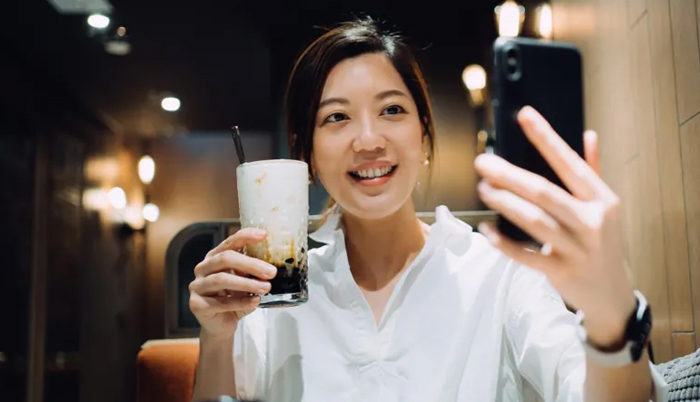![]() Home > World Business
Home > World Business
Is China's Bubble Tea Bubble About To Burst?

Getty Images | Bubble tea has hit a sweet spot with millions but left some investors with a bitter taste
![]() May 18th, 2024 | 00:11 AM |
May 18th, 2024 | 00:11 AM | ![]() 82 views
82 views
CHINA
From its origins in 1980s Taiwan to today's global craze, bubble tea or boba, has come a long way.
Ask people under the age of 40 anywhere in the world whether they have ever tried the milky tea and tapioca ball concoction and there's a pretty good chance that they have.
Bubble tea has certainly hit a sweet spot with its many fans but it has left some investors with a bitter taste.
Stock market debuts of two China-based chains have already flopped. And there are at least two more share sales in the pipeline.
Despite these hiccups, it's undeniable that boba has become a global phenomenon after its popularity spread from Asia to the West.
From London to Helsinki and Buenos Aires to Cape Town, it's almost impossible to find a major city where it isn't on sale.
There are now an estimated half a million bubble tea shops in China alone - a huge market for the drink, and one not too far from its origins in Taiwan.
Thirty-something university lecturer Lili, who lives in the southern Chinese city of Guangzhou, first began drinking it while she was in primary school.
Today she cannot go long without her fix. "Bubble tea is an easy-to-get pleasure so I drink it quite often," she says.
Tina, an office worker from Beijing also in her 30s, tells a similar story. She first tried boba when she was a child and now drinks it several times a week. She often makes group orders with co-workers and friends from a wide variety of well-known shops.
Lili, Tina and millions of others like them have helped China's bubble tea businesses grow into a nationwide industry that last year was worth about 145 billion yuan ($20bn; £15.9bn), according to estimates by the China Chain Store & Franchise Association.
Innovation has been a key to its success "with new flavours and recipes constantly being launched", according to Jason Yu at consumer research group Kantar Worldpanel.
It's a strategy that resonates with Lili who says "promotion campaigns, brand collaborations and new flavours" have kept her going back for more.
That approach has also helped bubble tea chains expand beyond China's major cities, Mr Yu says.
This success story has continued even at a time when China's economy is slowing and consumers are tightening their belts.
Bubble tea "provides very much an affordable pleasure to consumers in China", said Mr Yu, pointing to the "wide price range" of products being offered by different bubble tea chains.
Some investors, however, have not shown the same level of enthusiasm.
Seeking to cash in on the craze, several Chinese tea chains have looked to sell shares to the public in recent years.
Last month, China's third largest bubble tea chain, Sichuan Baicha Baidao Industrial, known as Chabaidao, made its stock market debut.
The shares plunged on their first day of trade and have yet to recover.
That followed another disappointing debut by Shenzhen-based Nayuki.
Its shares have lost more than 80% of their value since their launch in Hong Kong almost three years ago.
Analysts point to a number of reasons for these weak performances, including concerns about the Hong Kong stock market as a whole.
The amount raised from new listings in the city since the start of this year has dropped to levels not seen since 2009, according to consultancy firm Deloitte.
But this hasn't discouraged other bubble tea chains from planning their own share sales.
Earlier this year, China's first and second largest chains by number of shops - Mixue Group and Guming Holdings - submitted applications to list on the Hong Kong Stock Exchange.
"Persisting weak market sentiment in Hong Kong is the primary reason" for Chabaidao's market blunder, said Gary Ng, a senior economist at Natixis.
He believes the city will struggle to attract new listings until there "is a clear sign of China’s pivot to growth and lower US interest rates".
Others, however, say investors are focusing on problems within the bubble tea industry itself.
It "has relatively low barriers to entry, leading to increased competition," said Kenny Ng, Securities Strategist of Everbright Securities International.
"Many companies rely on opening new stores to sustain revenue growth. However, this expansion strategy can lead to a decline in gross profit margins as companies face higher costs associated with store operations and management."
For bubble tea fans, growing competition has its advantages. Han is a regular boba drinker from Beijing who used to stay away from certain premium brands because she found them too expensive.
That has changed. She says price has become less of a factor when choosing between different brands because "they have a lot of discounts and vouchers".
But for bubble tea makers and their potential investors, lower prices and higher costs could prove to be an unattractive recipe.
"The Chabaidao case highlights the risks and does not bode well for the listings of other bubble tea chains," warned Gary Ng.
Lili and Han say there is another far more important risk associated with the often sugar-packed drink that is holding them back from ordering more - putting on weight.
Source:
courtesy of BBC NEWS
by João da Silva
If you have any stories or news that you would like to share with the global online community, please feel free to share it with us by contacting us directly at [email protected]